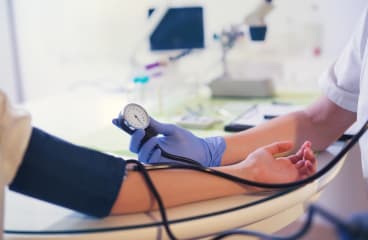
What is high blood pressure?
Blood pressure is a measure of how hard the blood pushes against the walls of the arteries as it moves through the body. It's normal for your child's blood pressure to go up and down throughout the day. But if it stays up, your child has high blood pressure. Another name for high blood pressure is hypertension.
What is normal and what is high blood pressure depends on your child's age, sex, and height. The numbers change as your child grows.
Blood pressure is described with two numbers. For example, a child's reading might be 96/57 or "96 over 57."
- The first number is the systolic pressure. It shows how hard the blood pushes when the heart is pumping.
- The second number is the diastolic pressure. It shows how hard the blood pushes between heartbeats, when the heart is relaxed and filling with blood.
What can happen when children and teens have high blood pressure?
When blood pressure is a little high, it may increase the risk of health problems, such as heart conditions, later in life.
If blood pressure is very high, it can cause serious and immediate damage to a child's body, especially the heart and brain. This type of high blood pressure is rare.
What causes high blood pressure in children and teens?
Primary, or essential, high blood pressure is a type of high blood pressure. With this type, doctors can't tell exactly what is causing the high blood pressure. But several things make a child more likely to get it. One is having a family history of it. These things include a family history of high blood pressure, having sleep apnea, and being overweight.
Secondary high blood pressure is caused by another disease or medicine. Problems that can cause secondary high blood pressure may include:
- Kidney disease.
- Congenital heart disease.
- Thyroid disease and other problems with glands in the body (the endocrine system).
Sometimes it can be caused by medicine a child is taking.
How is high blood pressure diagnosed in children and teens?
Children age 3 and older often have their blood pressure checked during routine doctor visits. If your child's blood pressure reads high, you may be asked to bring your child in again for another blood pressure check.
The doctor might have your child wear a portable device to measure blood pressure over 24 hours.
Your child may need more tests to check for illnesses that may be causing high blood pressure.
How is it treated?
High blood pressure is treated in different ways. Treatment depends on how high the blood pressure is. When it's just a little high, doctors often treat it with a healthy lifestyle, like eating healthy foods and being active.
If the blood pressure is higher and if a healthy lifestyle doesn't help lower it enough, the doctor may recommend medicine.
If another health problem is causing the high blood pressure (secondary high blood pressure), treating the other health problem may lower the blood pressure. Your child may also need medicine to lower it.
Give your child healthy foods, including fruits, vegetables, and whole grains. Limit sodium and sugar. And help your child stay active. Consider less screen time. If your child takes medicine, try to make their pill schedule as simple as you can. Taking medicine at mealtime may help.
How can you make it easier for your child to take blood pressure medicines?
If your child has very high blood pressure, medicines may be needed. Your doctor can tell you how long your child may need to take medicine.
It can be hard to remember to help your child take pills when there are no symptoms. But blood pressure will go back up if your child doesn't take the medicine. Here's something that can help.
- Make your child's pill schedule as simple as you can. Try to plan a time for your child to take medicine along with something else that happens at that same time every day. This can be something like eating a meal or getting ready for bed. If that's hard to do, you or your child can set a daily alarm as a reminder.
Medicines for high blood pressure have side effects. Ask your doctor what side effects to look for and what to do if you see them.
Where can you learn more?
Go to http://www.healthwise.net/patientEd
Enter O267 in the search box to learn more about "Learning About High Blood Pressure in Children and Teens".
Current as of: October 2, 2025
Author: Ignite Healthwise, LLC Staff
Clinical Review Board
All Ignite Healthwise, LLC education is reviewed by a team that includes physicians, nurses, advanced practitioners, registered dieticians, and other healthcare professionals.

